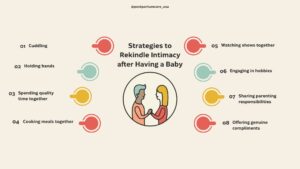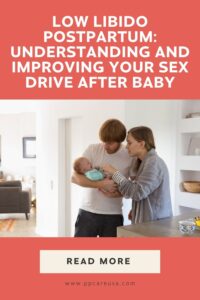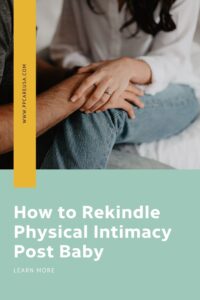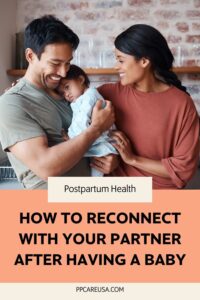Many new mothers experience low libido postpartum. It’s a normal part of the postpartum journey due to hormonal shifts, physical recovery, and emotional changes. This article will be an honest discussion to help you understand why this happens and how you can address it.
Key Takeaways
- Low libido postpartum is normal and caused by hormonal shifts, physical recovery, and emotional changes as new moms adjust to life after childbirth.
- Reconnecting emotionally and prioritizing non-sexual touch can help couples rebuild intimacy during the postpartum phase.
- Seeking professional help is important if low libido persists, as specialists can provide support and solutions for sexual dysfunction related to postpartum changes.
Why Low Libido Postpartum is Completely Normal

First and foremost, experiencing a low libido postpartum is completely normal. The postpartum period is a time of immense physical and emotional shifts, and these changes can significantly impact a mother’s sex drive. Your body is healing, adjusting to a new life, and it’s natural for your libido to take a backseat during this process.
Hormonal changes play a big role in this. After childbirth, the levels of estrogen and progesterone drop dramatically, which can lead to a decreased interest in sexual activity. If you’re breastfeeding, the hormone prolactin, which helps produce milk, can further lower estrogen levels, contributing to vaginal dryness and reduced libido.
Remember, these changes are not personal. If your partner feels confused or rejected, communicate that these feelings are common for most women and linked to the natural hormonal shifts occurring in your body and the physical changes that can accompany them, especially for two women.
Feeling guilty about a decreased libido is also something many new moms experience, but you should be kind to yourself. You’re adjusting to a new life, and your body and mind are recovering from the incredible feat of childbirth. Remember, it’s totally normal to experience lower sex drive during the first six months postpartum.
Common Causes of Decreased Libido After Childbirth
Knowing the common causes of decreased libido after childbirth can help you feel more in control and less isolated. Hormonal fluctuations are a primary culprit. After giving birth, the drop in estrogen and progesterone levels can significantly reduce sexual desire. Breastfeeding mothers often experience even lower estrogen levels, leading to vaginal dryness and discomfort during sex, which can further diminish interest.
Physical recovery from childbirth is another significant factor. Whether you had a vaginal birth or a c-section, your body needs time to heal. Stitches, soreness, and general fatigue can make the idea of sexual activity less appealing.
Sleep deprivation is another major player. The demands of babies often mean that new parents are getting far less sleep than they need, and this overwhelming fatigue can elevate stress hormones, further diminishing libido.
Emotional challenges and the increased responsibilities of caring for a newborn can also impact sexual desire. Many postpartum women feel self-conscious about their postpartum bodies, which can contribute to a lower sex drive and decreased sex drive. The emotional toll of adjusting to a new routine and the potential for postpartum depression can also shift focus away from intimacy and desires, affecting the overall postpartum experience and postpartum sex drive.
These factors combined can create a perfect storm for decreased libido during the first six months postpartum.
How Long Does Postpartum Low Libido Last?
The duration of postpartum low libido can vary widely among women. For some, it might last just a few months, while others might find that it continues for 18 months or more. This variability is normal and depends on numerous factors, including the individual’s physical recovery, hormonal balance, and emotional well-being.
Physical recovery from childbirth, including healing from labor or surgeries like c-sections, can delay the return of libido. The body needs time to heal, and discomfort during sex can persist until full recovery is achieved. Hormonal changes, particularly the low estrogen levels associated with breastfeeding, can also prolong a decrease in libido, as they contribute to vaginal dryness and discomfort.
Remind yourself that low libido is a temporary phenomenon that typically evolves over time. As your body heals and you adjust to your new role as a parent, your desire for intimacy will likely return. Patience and self-compassion are key during this period.

Strategies to Rekindle Physical Intimacy Post-Baby
Rekindling physical intimacy after having a baby can be challenging but achievable. Start by acknowledging the new dynamics in your relationship and approaching intimacy with patience and understanding. Some women may feel ready for sexual intimacy as soon as their physical recovery is approved by a doctor, while others may need more time.
Focusing on emotional connections can be a great starting point. Small gestures that can help bridge the gap and make the transition back to sexual intimacy smoother include:
- Cuddling
- Holding hands
- Spending quality time together Taking walks together, even with the baby, can provide a refreshing break and strengthen your bond.
Engage in activities that allow you to reconnect as a couple outside of your roles as parents. Cooking meals together, watching shows, or engaging in hobbies can help you maintain a sense of self and partnership. Sharing parenting responsibilities and offering genuine compliments can enhance your emotional connection.
Non-Sexual Touch and Emotional Closeness
Non-sexual touch and emotional closeness are key in rebuilding intimacy and can increase your interest in sex over time. Small gestures like holding hands, cuddling, or even a simple back rub can greatly enhance emotional bonding during the postpartum phase. These acts of physical contact help maintain a sense of closeness without the pressure of sexual activity, making both partners feel connected and supported.
Spending quality time together doing enjoyable activities is important. Whether it’s watching a favorite show, taking a walk, or just talk about your day, these moments help maintain intimacy and keep the relationship strong.
Remember, intimacy isn’t solely about sex; it’s about feeling connected and valued in the physically intimate life relationship with a woman.
Open Communication with Your Partner
Open communication with your partner is crucial for navigating postpartum changes in libido. Being honest and reassuring about the adjustments you’re experiencing can foster a supportive environment. Having an honest conversation about your physical and emotional needs can help you talk openly to address any concerns regarding postpartum sexual relations.
Regularly checking in allows for a better understanding of each other’s experiences and needs. Sharing feelings of healing, anxiety, or depression with your partner helps create a space of mutual support. Small gestures of appreciation and understanding can strengthen your emotional connection and make the return to intimacy easier.
If communicating about low libido is difficult, consider setting boundaries regarding emotional and physical support. This helps convey the need for rest and reduces stress before engaging in intimacy. Seeking counseling can also be beneficial if deeper emotional and relational factors are affecting your sexual health and low sex drive.
Prioritize Self-Care and Rest
Prioritizing self-care and rest helps new moms regain energy for intimacy. Taking care of your personal health and well-being can significantly influence your desire and readiness for physical intimacy. Getting adequate rest, even if it means napping when the baby naps, can help combat overwhelming fatigue and improve your mood.
Don’t hesitate to ask for help. Whether it’s from your partner, family, or friends, having a support system can make a big difference in managing sleep deprivation and finding time for self-care. The better rested and cared for you feel, the more likely you’ll regain interest in physical intimacy and sleeping.

Professional Help for Postpartum Sexual Dysfunction
If persistent low libido, vaginal dryness, or other sexual dysfunctions occur, seek support from a women’s health professional or GP. Many women find it beneficial to work with specialists such as gynecologists, pelvic floor physiotherapists, or sexologists who can address specific issues related to low libido postpartum.
Pelvic floor therapy can be highly effective in addressing issues related to muscle weakness and discomfort during intercourse. These professionals can provide targeted exercises and treatments that can help improve sexual function and comfort.
Consult a doctor if you’re not ready to resume sexual activity due to low postpartum libido. Professional help can provide you with the tools and support needed to navigate this challenging period and enhance your overall well-being.
Reconnecting with Your Partner Beyond Sex
Reconnecting with your partner beyond sex is vital for a strong, healthy relationship. Remembering your identity as partners and not just parents can strengthen your bond. Engaging in low-pressure physical interactions like kissing, cuddling, and holding hands can ease feelings of anxiety around intimacy.
Spending quality time together is crucial. Whether watching a funny show, sharing a meal, or reminiscing about parenting mishaps, these activities help maintain a sense of connection and joy in your relationship. Small, low-pressure moments of physical touch can also help keep the intimacy alive without the immediate pressure of sexual activity.
Focusing on these aspects nurtures your relationship and ensures that both partners feel valued and connected, even when taking care of a tiny human is emotionally draining and your sex lives might be the last thing on your mind.
Summary
In summary, experiencing postpartum libido or postpartum sex drive changes are a completely normal part of the postpartum period. The physical, hormonal, and emotional changes that occur after childbirth can significantly impact a mother’s sex drive. Understanding these changes and their causes can help alleviate feelings of guilt and frustration.
Rekindling physical intimacy takes time, patience, and open communication. Prioritizing self-care and seeking professional help when needed can also make a significant difference. Remember, intimacy isn’t solely about sex; it’s about feeling connected and supported in your relationship. Take small steps, be kind to yourself, and trust that your libido will return in time.
Frequently Asked Questions
Is it normal to have a low libido months postpartum?
Absolutely, it’s normal to have a low libido months after giving birth. Hormonal shifts, physical healing, and emotional changes can all play a role in this.
What are some common causes of decreased libido after childbirth?
Decreased libido after childbirth often stems from hormonal changes, physical recovery, sleep deprivation, and emotional hurdles like postnatal depression. It’s important to acknowledge these factors as they play a significant role in your experience.
How long does postpartum low libido typically last?
Postpartum low libido can last anywhere from a few months to over 18 months, depending on the individual. It’s important to remember that everyone’s experience is different, so be patient with yourself.
What strategies can help rekindle physical intimacy post-baby?
To rekindle physical intimacy after having a baby, try incorporating non-sexual touch, keep the lines of communication open with your partner, and don’t forget to prioritize self-care and rest. These steps can make a big difference!
When should I seek professional help for postpartum sexual dysfunction?
If you’re dealing with ongoing issues like low libido or vaginal dryness after childbirth, it’s crucial to reach out to a women’s health professional or your GP for help. Don’t hesitate to get the support you need!
Pin This for Later:



Postnatal Depletion
Meet the Team
Our Services
Supplements
A virtual healthcare clinic that helps postpartum mamas recover from postnatal depletion syndrome with a holistic approach.

Get in touch